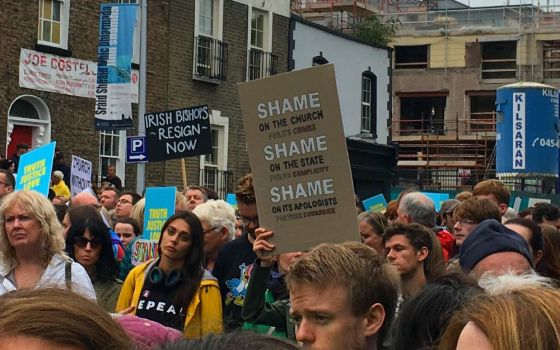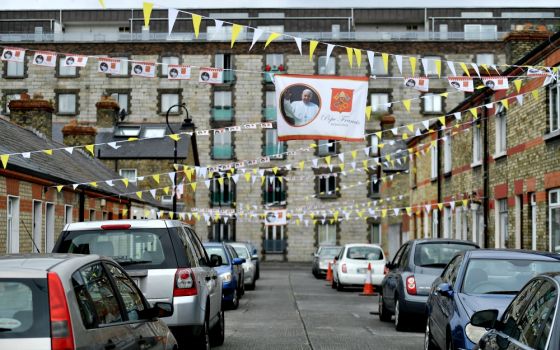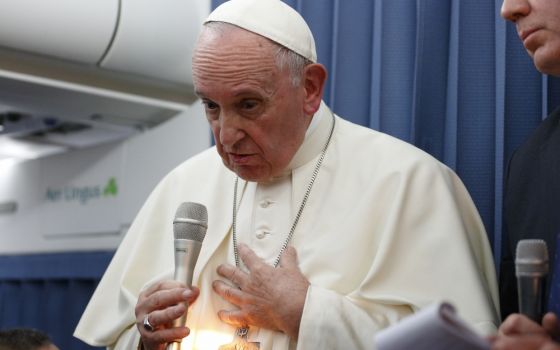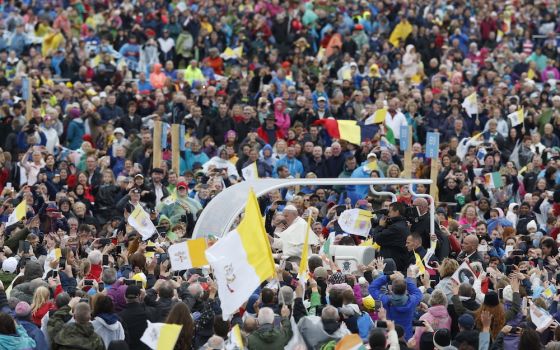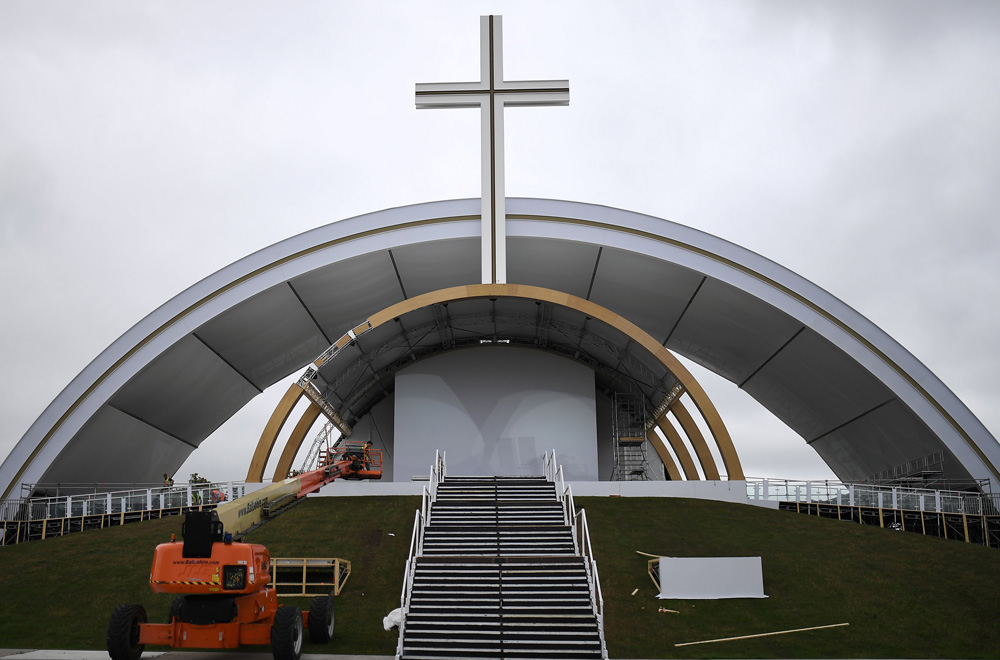
The stage from where Pope Francis will celebrate Mass is seen under construction Aug. 19 at Phoenix Park in Dublin. Pope Francis will visit Dublin and Knock, Aug. 25-26, mainly for the World Meeting of Families. (CNS/Clodagh Kilcoyne, Reuters)
Preparations are almost complete at the Royal Dublin Society for the 37,000 people from 116 countries who will attend the World Meeting of Families' pastoral congress, which formally opens tonight and runs from Wednesday until Friday.
Up to 20,000 pilgrims are due to descend on Ireland for this Aug. 22-24 event and the Aug. 25-26 papal visit. Up until last week, the only thing that looked to mar it all was the Irish weather.
But in the wake of the Pennsylvania grand jury report, World Meeting of Families lost a keynote speaker as U.S. Cardinal Donald Wuerl of Washington under pressure over his handling of abusive priests while he was bishop of Pittsburgh from 1988 to 2006, announced his withdrawal from the event.
He is the second senior U.S. prelate to withdraw from the World Meeting of Families.
Last week, Boston Cardinal Sean O'Malley announced he would not be traveling to Ireland due to "important matters pertaining to the pastoral care of St John's Seminary in the Archdiocese of Boston and the seminarians enrolled in the formation program there."
The absence of "voices" is becoming something of a theme of the World Meeting of Families, beginning with the editing out of Los Angeles auxiliary Bishop David O'Connell's words of recognition of the existence of LGBT families from the Amoris Laetitia resource video for the international gathering.
The withdrawal of O'Malley's voice is a particular blow as he was involved in the meeting's first ever component on safeguarding children. As the head of the pope's Pontifical Commission for the Protection of Minors, O'Malley's input was eagerly awaited by survivors and church people alike, and the session was to be televised due to the level of interest.
Another series of voices and themes that won't make it onto the pastoral congress' agenda was highlighted in an Aug. 20 discussion at Trinity College Dublin.
"Voices Pope Francis Will Not Hear" — hosted by the Wijngaards Institute for Catholic Research, a U.K.-based Catholic think tank — brought together Catholic theologians and campaigners to discuss topics and people excluded from the international Catholic gathering.
These included the marginalization of women and LGBT persons; the ongoing silencing of priests and theologians; the harm caused by the papal ban on contraception; the abuse scandal and the recent abortion referendum in Ireland.
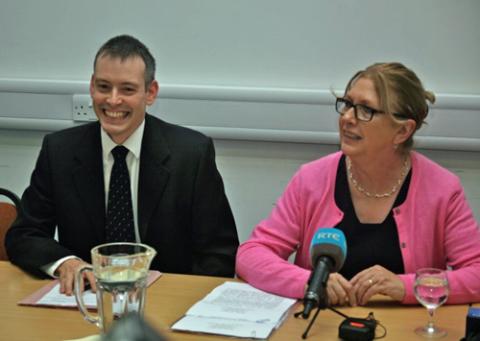
Luca Badini and Mary McAleese (Colm Holmes)
Luca Badini, director of research at the Wijngaards Institute and author of Democracy in the Christian Church, was the lead author of a 2016 report titled "Catholic Scholars' Statement on the Ethics of Using Contraceptives." In his address, Badini said the scale of betrayal and cover-ups and outright criminal behavior revealed by the clerical sex abuse crisis in the past few weeks was "unprecedented."
He recalled Dublin Archbishop Diarmuid Martin's words Aug. 19 at St Mary's Pro Cathedral about the forthcoming papal visit. Martin stressed that it would "not be enough just to say sorry. Structures that permit or facilitate abuse must be broken down and broken down forever."
The archbishop, president of the World Meeting of Families, acknowledged that the scandals of abuse in the church have produced "a deep-seated resentment among believers."
"It is not just anger over the horror of abuse, but an anger at the role of church leadership in compounding the suffering of so many in institutions for children, for unmarried mothers and for vulnerable women," Martin said.
Badini also highlighted Francis' criticism of the culture of deferential clericalism in his Aug. 20 letter to the faithful on the abuse crisis.
Clericalism, the pope warned, "helps to perpetrate many of the evils that we are condemning today. To say no to abuse is to say an emphatic no to all sorts of clericalism."
This "caste mentality" of clericalism, Badini said, resulted in the lack of accountability, putting the institution first, secrecy and the reticence to listen to experts like Dominican Fr. Thomas Doyle or the late Richard Sipe, as well as the failure to listen to the laity.
In his address, Irish Redemptorist Fr. Tony Flannery, who was silenced by the Congregation for the Doctrine of the Faith in 2012, said there is "a whole different scene" under Francis.
"When people tell me that Francis has done very little, I absolutely disagree because it is a whole different scene."
Flannery highlighted how people now openly discuss the issues for which he had been silenced, such as women's ordination and human sexuality. His concerns lay with the processes of the Congregation for the Doctrine of the Faith, which were "totally and absolutely unjust and abusive."
Flannery criticized the Irish bishops' failure to join with superiors of the religious orders to which the four other Irish priest priests rapped by the Vatican belong to request that Francis lift the priests' censures. "It could have been a very significant gesture by the Irish church, but nothing happened," he said.
NCR columnist and books editor Jamie Manson spoke as a member of the LGBT community working with young LGBT people.
Referring to Amoris Laetitia, she noted that Francis writes of same sex couples or unions: "There are absolutely no grounds for considering homosexual unions to be in any way similar or even remotely analogous to God's plan for marriage and the family."
She told the audience such teachings created "profound shame in LGBT people" because it communicates that their "love is not capable of goodness or holiness in the way in which a heterosexual couple's is."
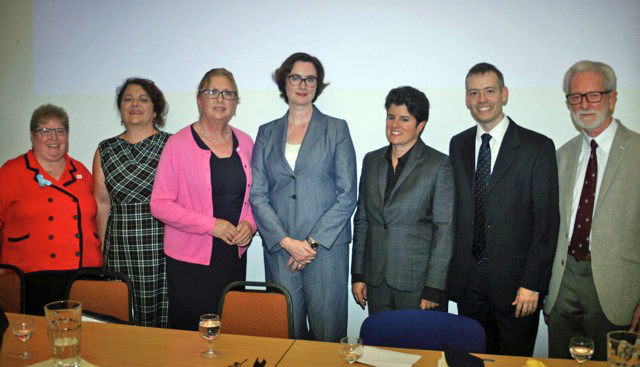
Marianne Duddy-Burke, Siobhan Garrigan, Mary McAleese, Miriam Duignan, Jamie Manson, Luca Badini and the Rev. Will Baynes, at the first event of Voices Pope Francis Won't Hear, Aug. 20 at Trinity College Dublin, in Dublin (Colm Holmes)
Manson said the church's teaching was a matter of life and death and referred to the "remarkably high suicide rate in every country among LGBT youth."
The disproportionate level of suicide among LGBT people was a factor also highlighted by Mary McAleese, former president of Ireland, as she launched a new research project, sponsored by the Wijngaards Institute, on the theology of sexuality and gender.
In her address, McAleese warned the church that it must accept responsibility for the damage inflicted on young LGBT people through its teaching on homosexuality.
McAleese referred to a 2016 study in Ireland which showed the rate of suicide among LGBT young people was twice that of the general population.
She said the Wijngaards collaborative research project, which will draw from the latest scientific evidence and the testimonies of LGBT Catholics, is the "first serious attempt to use the tools of interdisciplinary scholarship to challenge, probe and interrogate church teaching in the area of homosexuality."
Advertisement
Marianne Duddy-Burke, executive director of DignityUSA, which supports LGBT Catholics, is in Ireland to attend World Meeting of Families with her spouse and two children. She related their difficulties with Catholic adoption agencies as the couple tried to foster and adopt their children, Emily and Finn, and also difficulties of LGBT couples who attended the 2015 World Meeting of Families in Philadelphia.
"For me and my family, it is important that we be here. We may be the only rainbow family in the entire gathering but without us the group gets to speak about us as 'them.' Because we are present, we are 'us' and our church is 'us,' " she said.
[Sarah Mac Donald is a freelance journalist based in Dublin.]






